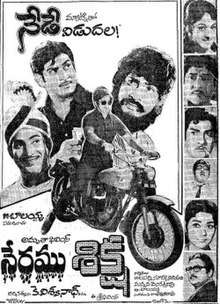Neramu Siksha
Neramu Siksha (నేరము – శిక్ష) (English:Crime and Punishment) is a 1973 Telugu drama film written and produced by M. Balaiah with adapted screenplay and direction by K. Viswanath.[1][2][3] The film is a Telugu adaptation of Fyodor Dostoevsky's Crime and Punishment (1866). The film received positive reviews from critics.[4][5][6][7][8] The film was remade in Tamil as Needhikku Thalaivanangu and in Hindi as Shikshaa.
| Neramu Siksha | |
|---|---|
 Theatrical release poster | |
| Directed by | K. Viswanath |
| Produced by | M. Balaiah |
| Written by | Samudrala Modukuri Johnson (dialogues) |
| Screenplay by | K. Viswanath |
| Story by | M. Balaiah |
| Starring | Ghattamaneni Krishna Bharathi Vishnuvardhan M. Balaiah Kaikala Satyanarayana Kanta Rao |
| Music by | Saluri Rajeswara Rao |
| Edited by | S. P. S. Veerappa |
Release date |
|
| Country | India |
| Language | Telugu |
Plot
Krishna is the son of a rich business couple (Kanta Rao and Pandari Bai). Bharathi is also a daughter of another rich man (Rao Gopal Rao). Krishna has grown up without knowing or facing any problems and gets a new car. While driving in competition with his friend Satyam (Satyanarayana), he accidentally kills Balaiah's brother and blinds Balaiah. Somehow this incident comes to the knowledge of Kanta Rao and he confronts Krishna and throws him out of house. Krishna then ends up as one of the servants at Rao Gopal Rao's home. He also gets to know Balaiah and his family. He realizes the intensity of his mistake and vows to make Balaiah and his family's life better. Balaiah on the other hand, vows to kill the person responsible for his brother's death and his blindness. Knowing about his fate in the hands of Balaiah, Krishna keeps helping them. Finally, Balaiah learns about Krishna and forgives him.
Credits
Cast
- Ghattamaneni Krishna as Vijay
- Bharathi Vishnuvardhan as Sujatha
- M. Balaiah as Blind man
- Kaikala Satyanarayana as Satyam
- Kanta Rao as Hero's Father, Rajasekharam
- Krishna Kumari
- Murali Mohan
- Pandari Bai as Hero's Mother
- Rao Gopal Rao as Narayana
- Arja Janardhana Rao as Blind man's brother
Crew
- Screenplay and Direction: K. Vishwanath
- Producers: Alaparti Suryanarayana and Mannava Venkata Rao
- Story: M. Balaiah
- Dialogues: Samudrala Ramanujacharya and Modukuri Johnson
- Production Company: Amrutha Films
- Director of Photography: G. V. R. Yoganand and B. Ramachandraiah
- Film Editing: S. P. S. Veerappa
- Choreography: Pasumarthi Krishna Murthy and Vempati Satyam
- Lyrics: Devulapalli Krishnasastri, Samudrala Ramanujacharya, C. Narayana Reddy, Kosaraju, Dasaradhi, P. Ganapati Sastry
- Original Music: Saluri Rajeswara Rao
- Assistant Composer: Puhalendi
- Playback Singers: S. P. Balasubrahmanyam, G. Anand, S. Janaki and P. Susheela
Soundtrack
- "Chesina Papam Needi Chitikina Bratukinkokaridi" (Lyrics: Devulapalli Krishnasastri)-
- "Daagudu Muta Dandakor"-
- "Emandi Saaru O Batlaru Doragaru"-
- "One Two One Two"-
- "Ramuni Bantunura"-
- "Vesavu Bhale Veshalu" -
References
- "Fyodor Dostoyevsky Adaptations". letterboxd.com.
- Nadadhur, Srivathsan (23 July 2015). "'True artists don't need fame'" – via www.thehindu.com.
- Narasimham, M. l (21 November 2010). "my first break" – via www.thehindu.com.
- "Neramu-Siksha Audio Release". Ragalahari. Retrieved 28 April 2010.
- "Neramu Siksha" – via www.imdb.com.
- http://www.onlinewatchmovies.net/2009/05/neramu-siksha-1973-telugu-movie-watch.html
- Rajadhyaksha, Ashish; Willemen, Paul (10 July 2014). "Encyclopedia of Indian Cinema". Routledge – via Google Books.
- Rowan, Terry. "Whodoneit! A Film Guide". Lulu.com – via Google Books.